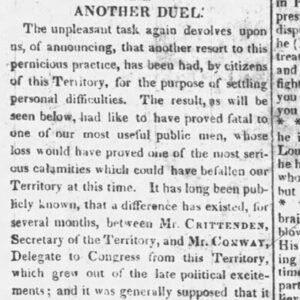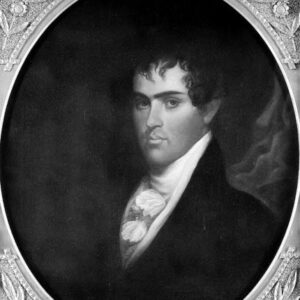calsfoundation@cals.org
Conway-Crittenden Duel
aka: Crittenden-Conway Duel
In 1827, Henry Wharton Conway and Robert Crittenden, both important figures in territorial Arkansas, fought a duel that had profound implications for the course of Arkansas history. Conway, a former naval officer and governmental employee originally from Tennessee, had relocated to Arkansas for a governmental post and eventually sought political office in Arkansas. Crittenden, originally from Kentucky, also served in the armed forces and later held political positions in Arkansas; he was originally a political supporter of Conway. Both were young, professional, and successful in their own right, but a conflict ensued between the two during an Arkansas election campaign, leading Crittenden to challenge Conway to a duel.
Conway and Crittenden were friends and had worked together in an official capacity in local Arkansas politics, Crittenden as secretary (a position comparable to the present-day lieutenant governor position) and Conway as delegate, or representative, from Arkansas Territory in Washington DC. Conway announced his campaign for reelection with the Democratic Party and was opposed by Robert C. Oden, a former military officer and Little Rock (Pulaski County) lawyer of the Whig Party. Interestingly, he was also quite well known for a duel that finally turned the local courts against the practice of dueling in 1820.
From its inception, the campaign was tense. Oden insulted Conway by declaring that Conway had only relocated to Arkansas for his governmental post and also accused him of mishandling government monies intended for the Quapaw Indians. Conway, in a public letter, attempted to explain the circumstances and said Crittenden had allowed Conway to keep some of the funds, which Crittenden denied happened. A back-and-forth argument ensued, with anonymous supporters taking part as well through letters published in newspapers. Because Conway had twice served as delegate for Arkansas and had assisted in building roads and founding institutions for the territory, he was still the stronger candidate and won the election. He claimed that Crittenden had made false statements about the funds and cited an earlier political conflict as to why Crittenden had turned against him. Crittenden felt that his honor had been insulted and issued a challenge to Conway, but not before another duel—between Ambrose Sevier and Thomas Newton—was fought in honor of Crittenden and Conway. Neither was injured in the Sevier-Newton duel, and the seconds ended it after the first shots rang out.
Crittenden and Conway dueled on October 29, 1827, near the confluence of the White and Mississippi rivers in present-day east-central Arkansas, as Conway had already started a trip to Washington DC and it was an out-of-the-way location. Crittenden brought Benjamin Desha, federally appointed receiver of public monies, to serve as his second. Conway, for his second, brought Wharton Rector, the adjutant general of the Arkansas Territorial Militia who had also served as Regular Army paymaster in the territory. At a designated distance, the men turned and shot. Conway’s bullet grazed Crittenden’s coat, but Crittenden shot Conway in the chest. Conway was taken to the home of William Montgomery, a tradesman originally from Tennessee, and succumbed to his wound days later on November 9.
Before the duel, Conway had entrusted testimony as to Crittenden’s provocations of Conway, and the challenge letter itself, to William Woodruff, founder of the Arkansas Gazette, who published it after the event. Crittenden was indicted, but the charges were dropped because the letter stated no date for the duel. A special election was held to elect a new delegate for Arkansas Territory, and Ambrose H. Sevier, a cousin and supporter of Conway who had fought the earlier duel in his honor, won the contest with support from the Conway family—a powerful political alliance known as “The Family” that grew from the ashes of the duel. He represented Arkansas as delegate until Arkansas statehood in 1836 and subsequently became the new state’s senator.
For additional information:
Sherwood, Diana. “The Code Duello in Arkansas.” Arkansas Historical Quarterly 6 (Summer 1947): 186–197.
White, Lonnie J. “The Election of 1827 and the Conway-Crittenden Duel.” Arkansas Historical Quarterly 19 (Winter 1960): 293–313.
M.V. Bowks de la Rosa
University of Maryland
 Louisiana Purchase through Early Statehood, 1803 through 1860
Louisiana Purchase through Early Statehood, 1803 through 1860 Conway-Crittenden Duel Story
Conway-Crittenden Duel Story  Robert Crittenden
Robert Crittenden 




Comments
No comments on this entry yet.